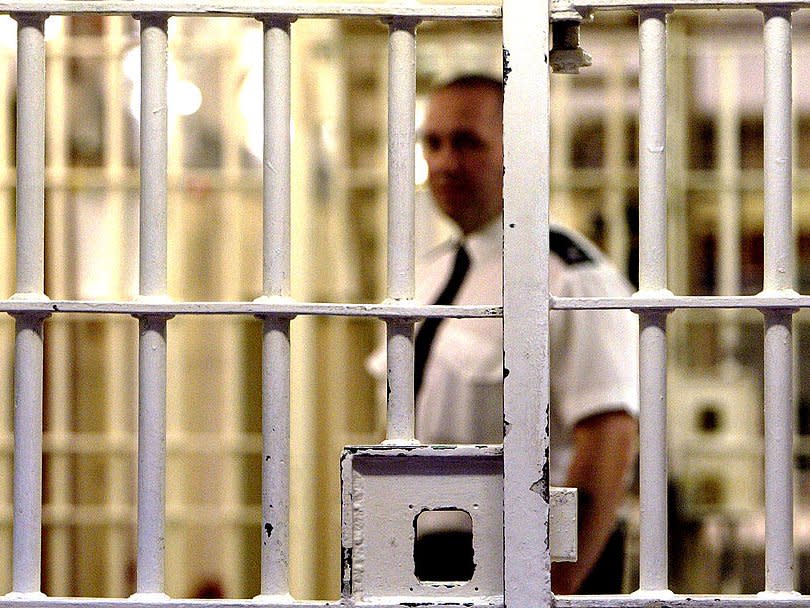Prisoner self-harm in England and Wales reaches record high with 41,103 incidents in year

Self-harm in prisons in England and Wales has reached a record high of more than 41,000 incidents in a year amid a surge in violence.
“Safety in custody” statistics released by the Ministry of Justice (MoJ) painted a grim picture of British jails, showing more attacks on both prisoners and staff than ever before.
The number of assaults hit another record of 27,193 incidents, including 3,687 deemed “serious” in the 12 months to June, up 14 per cent from the previous year.
There were 19,678 prisoner-on-prisoner assaults and 7,437 assaults on staff.
The number of prisoners who died in custody has slightly fallen from 324 to 300 in the past year, with 77 described as “self-inflicted” by the MoJ – including five women – and three murders.
Self-harm has risen by 12 per cent and around 2,800 incidents left people needing hospital treatment.
The statistics came months after the Government was warned that prisons were being “turned into powder kegs” with underfunding, overcrowding and staff shortages.
Mark Day, head of policy at the Prison Reform Trust, said that too many prisoners were being held in “overcrowded and impoverished conditions” with too few staff to provide a safe and constructive regime.
“Despite a small but welcome fall in deaths, every other indicator points to the ongoing and longstanding deterioration in standards of safety in our overstretched prisons,” he added.
“With prison numbers projected to increase, declining levels of safety will be very difficult to turn around without a concerted effort by ministers to take the pressure off the system by reducing prison numbers.”
Frances Crook, chief executive of the Howard League for Penal Reform, said: “It is extremely worrying that ministers have announced the roll-out of more weaponry for staff, when these figures reveal that the most disturbing problem in prisons is an epidemic level of self-injury and distress.
“The fall in the number of people dying in prison is encouraging, but there is no room for complacency when it remains the case that a prisoner dies by suicide every five days.”
She is due to meet the Justice Secretary, who will be urged to take immediate action to relieve pressure on the system and reduce the number of inmates.
The Howard League said separate figures showed prisons were “increasingly resorting to draconian measures to punish rule-breaking in a desperate attempt to maintain control”.

Almost 47,000 adjudication outcomes were recorded between January and March, of which 5,581 resulted in lengthened sentences – a 30 per cent increase on the same period in 2016.
As of Friday, there were 85,469 people in jail in England and Wales, which is 1,090 below the “useable operational capacity” of the estate.
The population has almost doubled since the early 1990s and is forecast to rise further as new sentencing guidelines that could see punishments increased for offences including terrorism and domestic abuse are considered.
The alarm was raised earlier this week after figures revealed a sharp rise in offenders being sent back into custody for breaching bail, sometimes over issues as minor as getting a taxi without permission or being late to meet their probation officer.
Last year around 21,700 people were recalled to prison and the measure’s growing use has cast doubt over the effectiveness of the Government’s flagship probation overhaul in 2015.
Supervision on release was extended to offenders serving sentences of less than 12 months, despite warnings that recalls could heap pressure on prisons that are struggling to cope with a toxic cocktail of drugs, violence and soaring suicide rates among inmates.
Ed Davey, a Liberal Democrat MP, urged courts to stop using “useless” short-term sentences and focus more on rehabilitation and reform.
“Our prisons are fit to bursting and this is leading to horrific incidents of self-harm and violence,” he added.
“The Government’s inability to get a grip on this issue is condemning prisoners and staff alike to suffer in miserable conditions, creating a vicious cycle.”
Tensions have boiled over into several riots in the past year, including at HMP Bedford, which was turned into a “sad picture of devastation” in violence that started after inmates were locked in their cells for 23 hours a day and denied basics including toilet paper.
An investigation concluded that the treatment and chronic staff shortages sparked the violence, which was soon followed by another major riot at the G4S-run HMP Birmingham.
The Independent Monitoring Board called on the Government to ensure that all British prisons have “sufficient staff to run decent and humane regimes”.
David Lidington, the Justice Secretary, said £100m was being invested to increase frontline staff and put more officers on wings, with 1,290 extra prison officers recruited over the past year – half the Government’s target.
Another £2m is being spent on body-worn cameras that hope to be work as a “visible deterrent” against violence and help prosecutions, and new handcuffs are being introduced alongside a type of pepper spray.
“Our prison staff work incredibly hard and I am under no illusions about the challenges they face,” Mr Lidington said.
“Violence against our dedicated staff will never be tolerated which is why I am supporting a Bill to increase sentences for those who attack emergency workers, including prison officers.
“I have been clear that it will take time, but I am determined to tackle the issues that undermine prison safety.”

 Yahoo News
Yahoo News 
